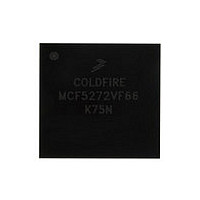MCF5272VF66 Freescale, MCF5272VF66 Datasheet - Page 297

MCF5272VF66
Manufacturer Part Number
MCF5272VF66
Description
Manufacturer
Freescale
Datasheet
1.MCF5272VF66.pdf
(544 pages)
Specifications of MCF5272VF66
Family Name
MCF5xxx
Device Core
ColdFire
Device Core Size
32b
Frequency (max)
66MHz
Instruction Set Architecture
RISC
Supply Voltage 1 (typ)
3.3V
Operating Temp Range
0C to 70C
Operating Temperature Classification
Commercial
Mounting
Surface Mount
Pin Count
196
Package Type
MA-BGA
Lead Free Status / RoHS Status
Not Compliant
Available stocks
Company
Part Number
Manufacturer
Quantity
Price
Company:
Part Number:
MCF5272VF66
Manufacturer:
HYNIX
Quantity:
19
Company:
Part Number:
MCF5272VF66
Manufacturer:
FREESCAL
Quantity:
885
Company:
Part Number:
MCF5272VF66
Manufacturer:
Freescale Semiconductor
Quantity:
10 000
Part Number:
MCF5272VF66
Manufacturer:
FREESCALE
Quantity:
20 000
Company:
Part Number:
MCF5272VF66J
Manufacturer:
Freescale
Quantity:
256
Company:
Part Number:
MCF5272VF66J
Manufacturer:
Freescale Semiconductor
Quantity:
10 000
Company:
Part Number:
MCF5272VF66R2
Manufacturer:
Freescale Semiconductor
Quantity:
10 000
Company:
Part Number:
MCF5272VF66R2J
Manufacturer:
Freescale Semiconductor
Quantity:
10 000
- Current page: 297 of 544
- Download datasheet (7Mb)
Chapter 13
Physical Layer Interface Controller (PLIC)
This chapter provides detailed information about the MCF5272’s physical layer interface controller
(PLIC), a module intended to support ISDN applications. The chapter begins with a description of
operation and a series of related block diagrams starting with a high-level overview. Each successive
diagram depicts progressively more internal detail. The chapter then describes timing generation, the
programming model, and concludes with three application examples.
The reader is assumed to have a basic familiarity with ISDN technology and terminology. A glossary
containing many ISDN terms can be found on the web at the following URL:
http://www.tribecatech.com/isdnterm.htm.
13.1
Introduction
The physical layer interface controller (PLIC) allows the MCF5272 to connect at a physical level with
external CODECs (coder/decoder) and other peripheral devices that use either the general circuit interface
(GCI) or interchip digital link (IDL) physical layer protocols. This module is primarily intended to
facilitate designs that include ISDN (integrated services digital network) interfaces.
The MCF5272 has four dedicated physical layer interface ports for connecting to external ISDN
transceivers, codecs, and other peripherals. There are three sets of pins for these interfaces. Port 0 has its
own dedicated set of pins. Ports 1, 2, and 3 share a set of pins. Port 3 can also be configured to use a
dedicated pin set. Ports 1, 2, and 3 always share the same data clock (DCL).
When the ports are operated in slave mode, the PLIC can support a DCL frequency of 4.096 MHz and
frame sync frequency (FSC/FSR) of 8 KHz. When in master mode, DCL should be no greater than
one-twentieth of the CPU clock (CLKIN), with a maximum FSC/FSR of 8 KHz.
This chapter is written from the perspective of connecting to an ISDN transceiver with 8-KHz frame sync.
The MCF5272 PLIC has four ports, port 0 – port 3, connected through three pin sets, numbered 0, 1, and 3.
A port can service, read, or write any 2B + D channel. As shown in
Figure
13-1, port 0 connects through
pin set 0, and ports 1 and 2 both connect through set 1. port 3 can use either pin set 1 or 3. Pin set 3 consists
of data in and data out. Data clock and frame sync are common to pin set 1 and 3. In the case of set 1, which
connects multiple ports, separate delayed frame sync generators are provided for each port which
distinguish each port’s active time slots. See
Section 13.6, “Application
Examples” for further
information.
®
MCF5272 ColdFire
Integrated Microprocessor User’s Manual, Rev. 3
Freescale Semiconductor
13-1
Related parts for MCF5272VF66
Image
Part Number
Description
Manufacturer
Datasheet
Request
R
Part Number:
Description:
Mcf5272 Coldfire Integrated Microprocessor User
Manufacturer:
Freescale Semiconductor, Inc
Datasheet:

Part Number:
Description:
MCF5272 Interrupt Service Routine for the Physical Layer Interface Controller
Manufacturer:
Freescale Semiconductor / Motorola
Datasheet:

Part Number:
Description:
TOWER ELEVATOR BOARDS HARDWARE
Manufacturer:
Freescale Semiconductor
Datasheet:

Part Number:
Description:
TOWER SERIAL I/O HARDWARE
Manufacturer:
Freescale Semiconductor
Datasheet:

Part Number:
Description:
LCD MODULE FOR TWR SYSTEM
Manufacturer:
Freescale Semiconductor
Datasheet:

Part Number:
Description:
DAUGHTER LCD WVGA I.MX51
Manufacturer:
Freescale Semiconductor
Datasheet:

Part Number:
Description:
TOWER SYSTEM BOARD MPC5125
Manufacturer:
Freescale Semiconductor
Datasheet:

Part Number:
Description:
KIT EVALUATION I.MX51
Manufacturer:
Freescale Semiconductor
Datasheet:

Part Number:
Description:
KIT DEVELOPMENT WINCE IMX25
Manufacturer:
Freescale Semiconductor
Datasheet:

Part Number:
Description:
TOWER SYSTEM KIT MPC5125
Manufacturer:
Freescale Semiconductor
Datasheet:

Part Number:
Description:
TOWER SYSTEM BOARD K40X256
Manufacturer:
Freescale Semiconductor
Datasheet:

Part Number:
Description:
TOWER SYSTEM KIT K40X256
Manufacturer:
Freescale Semiconductor
Datasheet:

Part Number:
Description:
Microcontrollers (MCU) MX28 PLATFORM DEV KIT
Manufacturer:
Freescale Semiconductor
Datasheet:

Part Number:
Description:
MCU, MPU & DSP Development Tools IAR KickStart Kit for Kinetis K60
Manufacturer:
Freescale Semiconductor
Datasheet:

Part Number:
Description:
24BIT HDMI MX535/08
Manufacturer:
Freescale Semiconductor
Datasheet:











